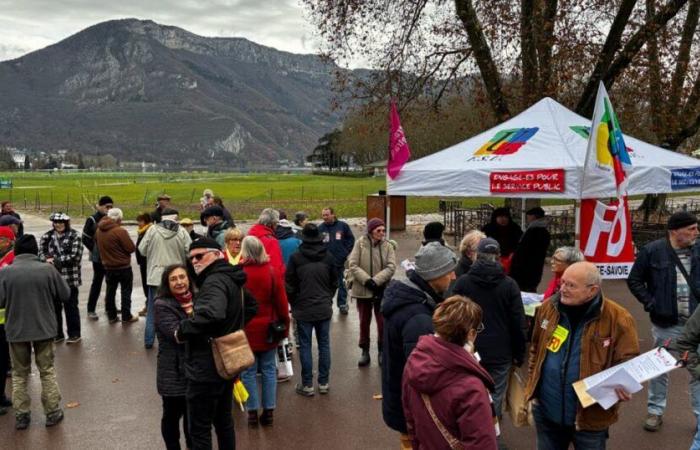
The price change was +19.7% between January 2017 and August 2024, and the pension was +13.6%. A shortfall in income which pushes some retirees to go to food distributions from charitable associations, such as Secours Populaire. Photo Le DL /Krystel Bablée
He doesn't lose his temper, Jean-Claude
Jean-Claude Lardeau of FSU 74 did not lose his temper during the press conference announcing the day of action on December 3. “How can we still maintain that retirees are wealthy, when in our troops, some can no longer join the demonstrations, due to lack of money for fuel? “.
And “Women are even more affected than men, because they often have not been able to have a complete career,” adds Sylvie Toulemon for Solidaires, “Alone, they are often forced to continue working, due to not being able to contact the two ends.” Or, for, “those who dare, they end up deciding to open the doors of charitable associations, and benefit from food distributions” assures Alain Collard of Force Ouvrière. And, according to the union representative, these are not isolated cases. Élisabeth, a young active retiree, who comes to lend a hand to Secours Populaire, comes to the bitter realization.
“The economy must not be built on the backs of retirees! With the 9 retiree organizations, we are going to make our voices heard, this December 3, throughout France, to demand that the pension not be below the minimum wage,” insists Alain Collard. Wishful thinking for Daniel Delanava who does not receive €1,426.30 net (for 35 hours per week). “When I saw what I was going to earn in retirement, less than 1,100 euros with the supplement, I had no choice, I had to continue working” confides the septuagenarian. “Two days a week, I do construction sites, cleaning, windows. I don't know yet how long I'll be able to do it, but if I stop, it's a disaster. I don’t even have the luxury of having a car.”
The retiree is careful with everything he buys, “the prices are increasing visibly, especially in the border area”. Daniel Delanava has thought about moving but “I am too attached to Haute-Savoie”.
Forced to continue to take on construction sites and do housework
Claude Garcin was also very attached to the region. But she ended up resolving to sell the chalet in Chablais, which she had acquired with her husband, to the great dismay of her children. However, the septuagenarian had worked 42 years and ended her career as a nurse in a large company, with “a good salary”. But then, after a divorce, she found herself, with her only pension, assuming, among other things, the maintenance costs of the chalet. The savings melted away quickly, “as time went on, I pulled the string a little more”, and soon he had to be “careful of everything, to prevent it from overflowing”. Above all, she knows, being from the South, that life is cheaper than on the banks of Lake Geneva, on the border with Switzerland. Since then, she has taken a rental in the South, and “asks a few fewer questions on a daily basis”.
Michèle Jourdan, for her part, “had to work until age 67” to hope to have a retirement of between 1,200 and 1,300 euros. “I couldn't take it anymore, my hip hurt, because of the repetitive movements,” breathes the former technical agent of a high school in the Annecy area. “At some point, the fatigue, the pain, it eats your nerves. We were like horses that smell like a stable,” she says.
At 70, and after finally asserting her retirement rights, Michèle Jourdan continues to calculate. “We're getting by, but not enough to do any crazy things,” she said. The rent, 1,000 euros for a T3 of 80 m2 in the Annecy basin, weighs heavily. “No choice, for an HLM, there is a 10-year wait.” Rather cheerful by nature, Michèle considers herself lucky. “There are two of us to take on the daily responsibilities. I know single women who receive pensions of 700 euros per month and who continue to do housework and ironing at age 74. Women, alone, will be the new poverty.”
Poverty figures
▶ Poverty in France is defined according to different income thresholds and family situation. The 50% poverty threshold (i.e. 50% of the median standard of living in France) is set at 1,014 euros for a single person and 1,520 euros for a couple without children.
. The situation has been worsened by galloping inflation (+4.9% in 2023) and a lack of recourse to social assistance for some households, according to the latest report on poverty from Secours Catholique-Caritas France.
▶ 31% of social housing residents are poor in Haute-Savoie (source Insee).
▶ 37% of social housing is T3, 40% of T3 tenant households are single people. 34% of T1s are occupied by single women and 54% by single men. Nearly four out of 10 social housing occupants are poor.
Observatory of inequalities, 2022.
France





